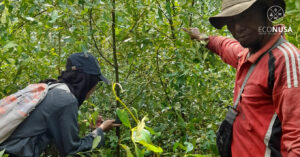
Synergy among regional and central governments’ policies is deemed one of important factors to sustain forests in Indonesia. Nonconforming policies will become a loophole to corporate to make use of forests by neglecting ecological condition and the community surrounding the forests.
As one of the countries with rainforests in the world, Indonesia should have preserved the remaining forests. Forests in Sumatera and Kalimantan have drastically contracted due to land use change. As a result, forests in the Land of Papua become the last frontier in of Indonesia. Forests in the Land of Papua do not merely serve as the global climate controller but also home to mega biodiversity and ‘mother’ of the indigenous community surrounding the forests.
West Papua Province’s Secretary, Nataniel D. Mandacan, said that West Papua has 8.75 million hectares of forests. As to him, these forests will be degrading due to the overlapping plantation permit with forest areas. “If we could build using another way, why we should build by touching forest areas,” said Nataniel in a virtual discussion on “Papuan Forests the Last Frontier for the Future of Indonesia” on 22 June 2020.
To sustain the forests, the Provincial Government of West Papua proclaimed its pledge to become a Conservation Province in October 2015. This initiative was followed up by Declaration of Manokwari in 2018 asserting the commitment of West Papua to sustain the 70% of land size as the protected areas.
Similarly, Papua Province also announced its commitment to sustain its forests. In addition to its agreement on the Declaration of Manokwari, Papua Province upheld its 2100 Vision as the basis for sustainable development. To meet the vision, Papua Province deliberated some regulations such as Special Bylaw (Perdasus) No. 21/2008 on Sustainable Forest Management in Papua Province and Perdasus No. 23/2008 on the Customary Rights of Indigenous People and Individual Rights for Land.
“In Papua spatial planning, we protect 80 percent (Papuan forest proportion is 80% of the land size. Edt.). This is deemed a guaranty to Indonesia and even to the world,” said Assistant II of Papua Province’s Secretary, Muhammad Musaad.
On the other hand, the regional government’s effort in forest protection has been influenced greatly by other parties including the central government. The gap of central and regional governments’ policies exposes high risks of the degrading forests cover in the future. Worse, it might be possible that forests in the Land of Papua will have the same fate as those of Sumatera and Kalimantan.
In the Law No. 41/1999 on Forestry, Article 18 stipulates that the government shall be obliged to sustain at least 30 percent forests areas as of the total size of island and or riverbank areas with proportional distribution. In the Job Creation Draft Bill, the stipulation of 30 percent allocation is eliminated.
“Our endeavors here will be to no avail if we are not in collaboration with many parties such as the central and regional governments, development partners, and even world,” said Musaad.
As to Musaad, the existence of forests is vital to meet the needs of Papuan peoples. There are 28 percent of villages in Papua located at the protected areas. The rest, 72 percent of villages is outside the protected areas which potentially lose their rights to natural resources management.
EcoNusa Foundation CEO Bustar Maitar said that more than 250 tribes in the Land of Papua are the most affected peoples when forests continue shrinking. The similar impact will also happen when the indigenous peoples fail to get benefits from forests they had been protecting from generation to generation. He said that both conditions should run side by side.
“It becomes challenge when rainforests in the Land of Papua are not saved, it will give significant impact to our efforts for climate change mitigation. Climate change does not merely occur in Papua and Indonesia, but also around the globe. It implies that Papuan forests play very significant roles to conserve the world climate,” Bustar added.
Bustar called all stakeholders to prioritize the interests of the indigenous peoples more than that of the corporate interests. Indigenous peoples are the owner of forests who deserves prioritized supports. “As the spearhead, the indigenous peoples should get backup to protect forests,” said Bustar.
Editor: Leo Wahyudi




